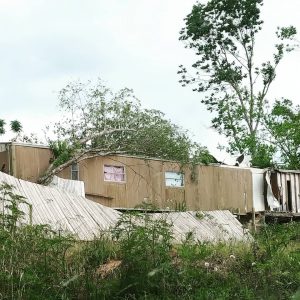September is National Preparedness Month, so right now is a great time to think about how you can be prepared, and then act on those thoughts and get ready for an emergency! This article will help get you thinking, give you some great starting points, and provide resources to turn to.
Emergencies Have a Wide Horizon
While hurricanes are likely the first thing panhandle residents think of when it comes to emergencies, are you prepared for others? Fires? Floods? Hail? Lightning? Tsunamis? Drought? Heat waves? Tornadoes? Possible winter storms? Marine oil spills? Major sewage problems? Other life-threatening medical disasters? Being prepared for a hurricane like Michael is vital to panhandle life, but it’s certainly wise to consider other possible disasters and to be prepared for anything.

Being prepared for an emergency can greatly reduce the stress it causes. (Photo source: Stephanie Herzog)
There are also so many ways to prepare for emergencies that it can be overwhelming to think about. Do you have sufficient food storage? What about clean water for your whole family (pets included)? How are you going to wash your clothes? How do you purify water? What if your toilet isn’t usable, what do you do? Can you safely start a fire if there’s no heat? What about shelter? How do you stop a gaping wound? How do you turn off the water to your house? What is the best evacuation route? How do you contact someone when there’s no power? Are those potentially life-saving prescriptions easily accessible? Where is the deed to your house, the title to your car, and your family’s vital identification documents? You’re filing an insurance claim, and you have no idea what brand your Smart TV was, where you bought it, how old it was, or how much it cost – what do you do?
Preparation Brings Relief
Have all of these questions got you thinking, but perhaps exhausted you? Now imagine that you could answer every one of these questions confidently – how do you feel? A weight lifted? Stress is a central source of fatigue for us all, and with it comes a variety of problems – mental, physical, financial, and social. Think of a time when you were prepared for the expected or unexpected – was your stress considerably less? Most likely it was. Preparation is a positive, proactive behavior that gives foresight into the unknown. Procrastination tends to be the default within a human’s nature, so being prepared doesn’t necessarily sound like a fun thing to do with your time. But it will be a game-changer for your life when the time comes that you have to react swiftly and decisively in the event of an emergency. The investment is well worth it!
However, you don’t have to do it alone. Thankfully, there are many professionals here to help you! Here are a few starter tips to aid you in the beginning of your preparation:
- Human Life. First and foremost, in an emergency the highest priority is that of preserving human life. Material objects can be replaced – a life cannot be. Always keep this in mind while preparing for and responding to emergencies!
- Sustenance Storage. Have adequate food and water storage for your needs. Label your food and water storage with the month and year to help track expiration dates.
- Canned and dehydrated foods are great for storage, and many items have a long shelf life.
- Remember one gallon of water per person/pet per day – store as much fresh water as you can! You can only survive a few days without water, but weeks without food.
- Plan in your near future to eat and drink the food and water supply that are nearing expiration and then replace the storage with fresh sustenance.
- 72-Hour Kit. Have a 72-hour kit for each member of your family, including pets. Backpacks or duffel bags are ideal grab-and-go containers. Keep a 72-hour kit both in your home and in your car.
- Review Annually. Pick one Saturday a year as your “emergency preparedness day” where you review all of your food and water storage, medical supplies and prescriptions, fire extinguishers, and all other emergency materials.
- Make an inventory and then head to the store to replace any expired or missing items.
- Clean and organize your storage space and emergency kits so everything is accessible.
- Evacuation Plan. Have an evacuation plan and put it on the calendar to practice it with your family – and even neighbors – every three months.
Start now to be prepared!
Additional Resources
- ready.gov
- Federal Emergency Management Agency (FEMA), 1-800-FEMA (3362)
- Florida Division of Emergency Management, 1-850-413-9969
- Extension Disaster Education Network (EDEN)
- Residents in Jackson County can sign up for the county’s alert system: alertjackson.com to stay informed of unexpected or threats
- Contact your local Family & Consumer Sciences Extension Agent to learn more about how to be prepared for your life
Sources
Jaffe, E. (2013, March.) Why wait? The science behind procrastination. Association for Psychological Science. https://www.psychologicalscience.org/observer/why-wait-the-science-behind-procrastination
Steel, P. (2007). The nature of procrastination: A meta-analytic and theoretical review of quintessential self-regulatory failure. Psychological Bulletin, 133(1), 65-94. http://dx.doi.org/10.1037/0033-2909.133.1.65
- Stress Management Tips for the Holiday Hullabaloo - November 27, 2019
- Bullying – Stop It! - October 11, 2019
- Proactive Preparation – National Preparedness Month - August 24, 2019
